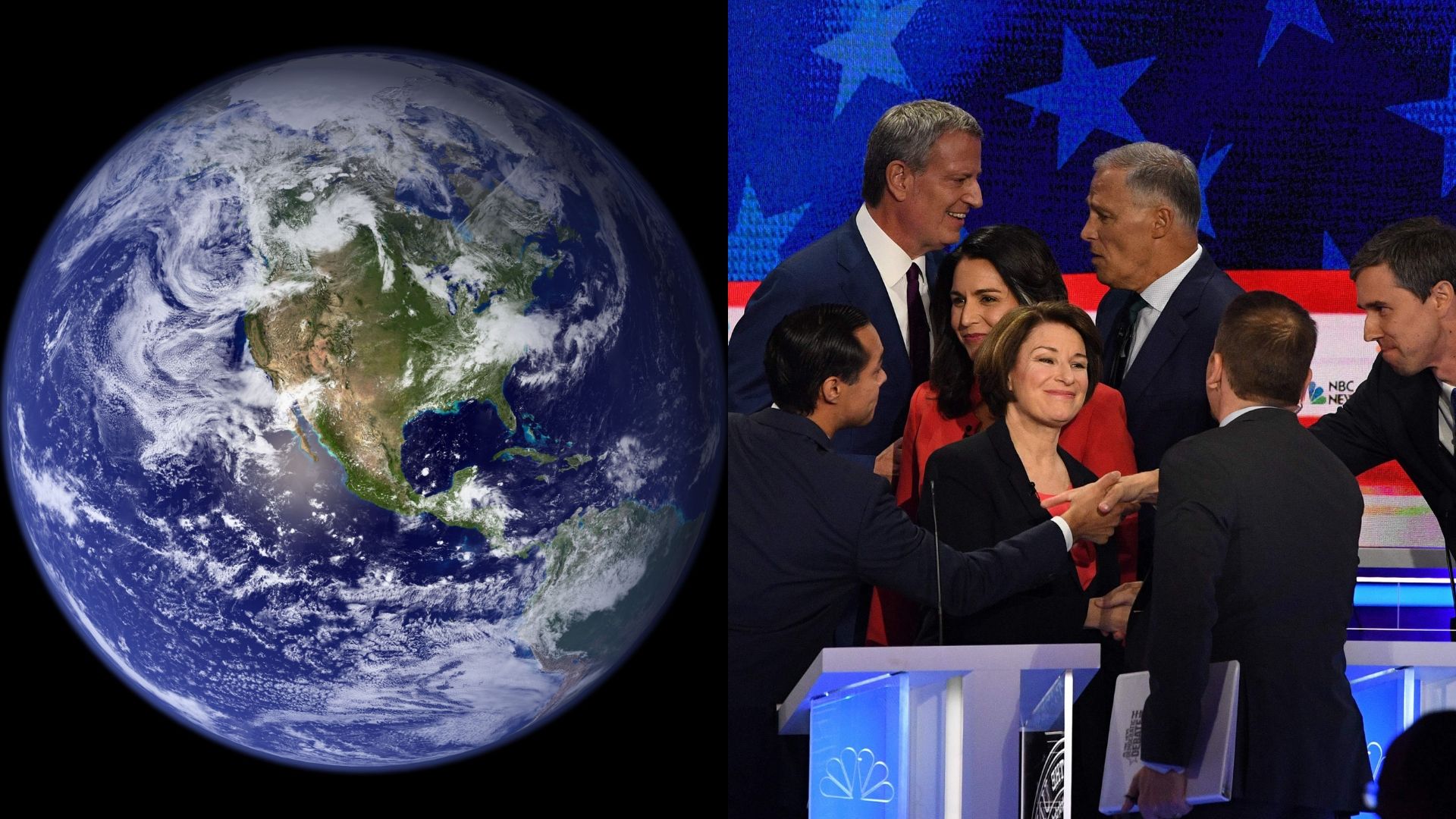Opinion: The Planet Was the Big Loser at the Democratic Debates

Credit to Author: Harry Cheadle| Date: Fri, 28 Jun 2019 12:57:39 +0000
There was never much chance that the first round of what’s sure to be an interminable number of Democratic primary debates would do much to inform people about the issues. The ten-candidates-onstage-at-a-time format guaranteed that none of them would get to talk for very long about anything in particular, each of them straining to have a solo moment that they could use to convince pundits, voters, and donors that they were the real deal. And in that game show–esque competition for attention, climate change was forgotten.
Our worryingly warming planet did get mentioned, of course. Elizabeth Warren brought it up in her opening statement on the first night, and she was among the multiple candidates who cited it as the number-one threat to America. John Delaney spoke briefly and passionately about carbon pricing before moderator Chuck Todd briskly pivoted to the next issue. But the first night had only seven minutes of discussion about climate, all in the back half of the program. And even then, the questions on climate were somewhat oddly framed, with Todd asking Julian Castro whether people living in at-risk areas should be forced to leave—arguably a relatively niche subject—and throwing Tim Ryan a question about climate mitigation that the Ohio congressman dodged in order to discuss the importance of building a “blue-collar party.”
On the second night, it got similarly short shrift, with the moderators not raising climate change until well into the second hour. The candidate who spoke the most about climate was second-tier contender John Hickenlooper, who has been criticized by environmentalists for his support for oil companies in his home state of Colorado.
All told, climate change was a topic of discussion for perhaps 15 minutes over the course of four hours of precious network TV time. You could argue that was appropriate, given that this is just one topic among many, or you could just look out your window. Miami, where these debates were held, is facing floods and storms of increasing power; even Florida’s most Trumpist politicians admit climate change is a problem. Other parts of the country are facing rising threats from wildfires and droughts. United Nations scientists estimate that to avoid truly catastrophic levels of warming, the world will need to slash its carbon emissions by 45 percent relative to 2010 in a little more than a decade—and those scientists may be too optimistic.
For months, left-wing activists have been demanding that the Democratic Party devote an entire debate to the subject of climate change. The little we got on the topic in these first debates shows what could be gained from such a thing. It might touch on subtopics like inequality (climate change disproportionately harms poor people, people of color, and women), partisan politics (the question of whether and how to work with the traditionally denialist GOP looms large), foreign policy (confronting China could be part of a climate plan), and the economy (there are intra-Democrat debates about the desirability of a Green New Deal that would guarantee jobs). Some thinkers have linked progressive causes like affordable housing and educating the world’s girls to fighting climate change. A clever candidate could use the issue as a springboard to discuss nearly anything.
Maybe more to the point, there’s evidence that the people watching these debates want one that tackles climate change, which has polled as one of the most important issues for Democrats. The left-wing group Data for Progress conducted a recent poll finding that 64 percent of left-leaning voters wanted a climate debate, and 15 Democratic candidates, including relative moderate Joe Biden, backed the idea. But the Democratic National Committee not only shot down the notion, it apparently told climate-focused candidate Jay Inslee that it would ban anyone who participated in an independent climate debate from future DNC-run debates. (That hasn’t stopped at least one group from offering to set up a climate debate.)
The media and political establishments failed too many ways to count in 2016, but one of their most glaring errors was barely mentioning climate change in the course of the election. Now we’re seeing what might be a repeat. The message from the Democratic base to their leaders couldn’t be clearer—protesters were literally outside the debates demanding climate change be addressed—but those with actual power are apparently content to ignore those cries. And if the Democratic establishment can shrug off demands that climate even be discussed, will it really listen to calls for action when it takes back the White House?
Follow Harry Cheadle on Twitter.
This article originally appeared on VICE US.